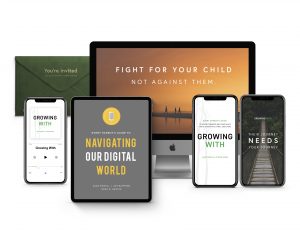The following blog post was inspired by Growing With: Every Parent’s Guide to Helping Teenagers and Young Adults Thrive in Their Faith, Family, and Future.
You grab your keys and head to your car for a 15-minute drive to the nearest shopping mall with your high school junior or senior. As you back down your driveway, you think, “Oh good, this will
give us a chance to talk about life after high school.”
Your child sitting next to you thinks, “Oh no, now he’s going to want to talk to me about life after high school.”
Both Steven Argue and I have realized (often through our mistakes) that planning with our learners (what we consider the stage between 13-18 years old) about their future can be a season of great family success or great family strife. If you want to grow with your child in these early vocational and college choices about life after high school, try the following:
Create a system that works for your learner to keep track of deadlines.
If your learner has the option of attending college, junior and senior years bring a quantum leap to the application, scholarship, and test deadlines that your family needs to track. Before shifting the burden of responsibility for all those deadlines to your learner (which we recommend), help them develop an organizational calendar and a system that works for them. It doesn’t matter if it’s a spreadsheet or a stack of sticky notes; what’s most important is that it works for your teenager.
Remember there is no single perfect job or school for your child.
Admittedly, all the unknowns after high school can be stressful. But don’t add an unnecessary cloud of anxiety to your family’s ecosystem by believing the lie that there’s only one great job or one great school for your learner. That puts too much pressure on the decision of one (often unpredictable) college admissions committee or one (potentially arbitrary) employer. Most high school graduates have lots of good options, any one of which sets them up to succeed in their twenties and beyond.
Be interpreters of their interests.
Learners will often answer “I don’t know” to questions about their future work aspirations or possible undergraduate majors. As parents, pay attention to what they’re interested in and help them see where their interests and gifts connect with real jobs. For example: Does he love babysitting? Perhaps he would be a great elementary teacher. Is she always looking for excuses to get outside? There are some exciting jobs in forestry, marine biology, or mountain guiding. Does she find herself taking appliances apart to discover how they work? Engineers or mechanics do that every day. Does he continually ask “why”? Maybe he would be a great reporter or writer.
Enjoy the ride.
My personality is rather type A (or at times, more like type A+). Before diving into the college experience with our oldest, I feared that I would put too much pressure on him—and myself to work every possible angle to enhance his college application and thus expand his college options. But early in Nathan’s junior year, I felt like God reminded me of this reality: I only get to go through this college experience with Nathan once. After that nudge, when I felt my inner anxiety—and my subsequent tendency to place undue pressure on my child—rise, I reminded myself that we’ll never get to go through this again, so let’s enjoy the ride!
Rest in God’s plan.
As a mom of three learners, one explorer, and one focuser summarized, “The most helpful prayer that God has led me to pray with sincerity is, ‘I trust you.’ I can almost mark the season when that went from being something I knew in my head to something that was a genuine anchor for me. God has our son covered. We are given responsibility but we are not ultimately responsible.”
Post inspired by Growing With
Photo by Warren Wong
Want more parenting resources?
Today is the last day to preorder Growing With and receive our free parenting bundle (valued at $97)!







 Dr. Kara Powell is the Executive Director of the
Dr. Kara Powell is the Executive Director of the
Leave a Comment